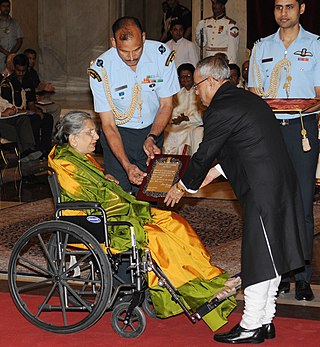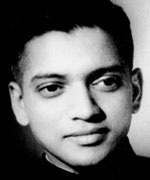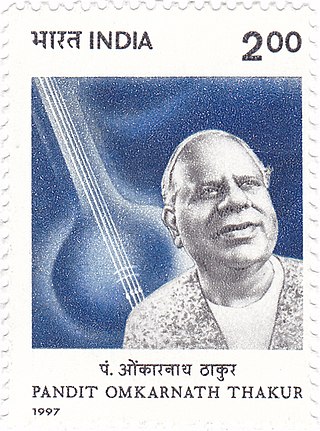Vinay Chandra Maudgalya | |
|---|---|
| Born | 2 April 1918 |
| Died | 1995 |
| Occupation(s) | Classical musician Vocalist |
| Known for | Indian classical music |
| Spouse | Padma Devi |
| Children | Madhup Mudgal Mukul Mudgal Madhavi Mudgal |
| Awards | Padma Shri |
Vinay Chandra Maudgalya (1918 - 1995) was an Indian classical musician, vocalist and the founder of Gandharva Mahavidyalaya, a music and dance academy for the promotion of Hindustani music and Indian classical dances. [1] He was a follower of Gwalior gharana. [2] The Government of India awarded him the fourth highest Indian civilian honour of Padma Shri in 1984. [3]
Vinay Chandra Maudgalya was born on 2 April 1918. He received his early training in Hindustani classical music at Vishnu Digambar Paluskar's academy in Lahore. Later, he trained under Vinayakrao Patwardhan in Pune. He arrived in Delhi in 1939, as a "lanky, strikingly handsome" 21-year old, with a mandate to set up a school for classical music in Delhi. [4]
Gandharva Mahavidyalaya was established in 1939. It was initially located in a rented flat near the now-closed Regal cinema in Connaught Place. [4] In the early years, there were few students, and Maudgalya would go around on his bicycle trying to persuade families to send their children to his academy. [5]
Maudgalya was awarded the civilian honour of Padma Shri by the Government of India in 1984. [6] He was married to Padma Devi and the couple had two sons, Madhup Mudgal, a renowned musician and the incumbent principal of Gandharva Mahavidyalaya, Mukul Mudgal, the retired Chief Justice of the Punjab and Haryana High Court who headed the Mudgal Committee, comprising Additional Solicitor General of India L Nageswara Rao and senior advocate and former cricket umpire Nilay Dutta, appointed by the Supreme Court to conduct an independent inquiry into the allegation of corruption, betting and spot-fixing in 2013 Indian Premier League [7] and a daughter, Madhavi Mudgal, an Odissi exponent. [8] Both Mudhup and Madhavi are also recipients of Padma Shri. [9] Mudgalya's music pursuit is one of the main features of the 2002 documentary film, Pratidhwani - Echoes, made by Basheer Ali which focuses on other renowned musicians such as Mohan Nadkarni, Naushad, Vasant Paluskar and Ravi Shankar as well. [10]
Maudgalya died in 1995. [11]
Hindustani classical music is the classical music of the Indian subcontinent's northern regions. It may also be called North Indian classical music or Uttar Bhartiya shastriya sangeet. The term shastriya sangeet literally means classical music, and is also used to refer to Indian classical music in general. It is played on instruments like the veena, sitar and sarod. It diverged in the 12th century CE from Carnatic music, the classical tradition of Southern India. While Carnatic music largely uses compositions written in Sanskrit, Kannada, Telugu, Tamil, Malayalam, Hindustani music largely uses compositions written in Hindi, Urdu, Braj, Avadhi, Bhojpuri, Bengali, Rajasthani, Marathi and Punjabi.

Veena Sahasrabuddhe was an Indian vocalist and composer of Hindustani classical music from Kanpur. Her singing style had its roots in Gwalior gharana, but it also borrowed from Jaipur and Kirana gharanas. Sahasrabuddhe was known as a singer of khyal and bhajan.

Pandit Vishnu Digambar Paluskar was a Hindustani musician. He sang the original version of the bhajan Raghupati Raghava Raja Ram, and founded the Gandharva Mahavidyalaya on 5 May 1901. He is also credited with arranging India's national song, Vande Mātaram, as it is heard today. His original surname was Gadgil, but as they hailed from the village Palus, they came to be known as the "Paluskar" family.

Shubha Mudgal is an Indian singer, and composer, known for her works in Hindustani classical music, Indian pop, and Tamil cinema. Her repertoire includes the genres of khyal, thumri, dadra. She has received the Padma Shri in 2000.
The Gwalior Gharana is first and the oldest Khyal Gharana in Indian Classical Music. The Gwalior Gharana is known as the "Gangotri" of Khyal raga and is considered the most ancient school of hindustani classical music. Other gharanas follows the lineage of the Gwalior Gharana.

Pandit Dattatreya Vishnu Paluskar, was a Hindustani classical vocalist. He was considered a child prodigy.
Balakrishnabuwa Ichalkaranjikar (1849–1926) was an Indian vocalist of the Khyal genre of Hindustani classical music. He learned the Gwalior gharana and brought it to Maharashtra.
Gandharva Mahavidyalaya New Delhi is an institution established in 1939 to popularize Indian classical music and dance. The Mahavidyalaya (school) came into being to perpetuate the memory of Pandit Vishnu Digambar Paluskar, the great reviver of Hindustani classical music, and to keep up the ideals set down by him. The first Gandharva Mahavidyalaya was established by him on 5 May 1901 at Lahore. The New Delhi school follows the syllabi set by the Akhil Bharatiya Gandharva Mahavidyalaya Mandal.

Pandit Omkarnath Thakur, was an Indian music teacher, musicologist and Hindustani classical singer. A disciple of classical singer Vishnu Digambar Paluskar of Gwalior gharana and the founder of Akhil Bharatiya Gandharva Mahavidyalaya Mandal he became the principal of Gandharva Mahavidyalaya, Lahore, and later went on become the first dean of the music faculty at Banaras Hindu University.He also wrote book "sangeetanjli" vol 1 to 6

Suresh Talwalkar is an Indian musician who plays the percussion instrument tabla.

Madhup Mudgal is an Indian Hindustani classical music vocalist., known for his khayal and bhajan renditions. A disciple of Kumar Gandharva, he is also a composer, conductor of famous Gandharva Choir and has been principal of the Gandharva Mahavidyalaya, Delhi, a music and dance school since 1995.

Madhavi Mudgal is an Indian classical dancer known for her Odissi dance style. She has won several awards, including the Sanskriti Award, 1984, President of India's award of Padma Shri, 1990, the Orissa State Sangeet Natak Akademi Award, 1996, Grande Medaille de la Ville by Govt. of France, 1997, Central Sangeet Natak Akademi Award, 2000, Delhi State Parishad Samman, 2002 and the title of Nritya Choodamani in 2004.
Professor B. R. Deodhar was an Indian classical singer, musicologist and music educator. He was a vocalist of Khayal-genre of Hindustani classical music.

Aarti Nayak-Kamath is an Indian Hindustani classical music vocalist working in the Gwalior gharana tradition. She has also performed in Sangeet Natak musical drama.
Pandit Vinayak Narayan Patwardhan was an Indian vocalist of Gwalior gharana of Indian classical music. Vinayakrao Patwardhan was a prominent and multifaceted figure of his time. As a distinguished disciple of the legendary Vishnu Digambar Paluskar, the founder of Akhil Bharatiya Gandharva Mahavidyalaya Mandal, he dedicated his life to the promotion of Hindustani music.
Justice Mukul Mudgal is a retired Indian judge of Delhi High Court, and remained Chief Justice of Punjab and Haryana High Court from 2009 to 2011. He is currently the head of the FIFA Governance Committee and Review Committee.

Vasundhara Komkali (1931–2015), popularly known as Vasundhara Tai, was an Indian classical musician and one of the leading exponents of the Gwalior gharana, an old Khyal tradition of Hindustani music. She was the wife of renowned musician, Kumar Gandharva, and was a recipient of the 2009 Sangeet Natak Akademi Award. The Government of India awarded her the fourth highest civilian honour of the Padma Shri, in 2006, for her contributions to Indian classical music.

Som Dutt Battu is a Shimla-based Hindustani classical vocalist of the Patiala Gharana. He was a winner of the civilian honour of Himachal Gaurav. He is also a member of Empanelment Committee for Hindustani Music at Indian Council for Cultural Relations New Delhi.

Shashwati Mandal is a Hindustani classical music vocalist. She is an exponent of the Gwalior gharana.
Vinayak Ramchandra Athavale, better known as V. R. Athavale or Vi. Ra. Athavale, was a Hindustani classical vocalist and one of the foremost Hindustani classical musicologists of the 20th Century, alongside Vamanrao Deshpande and Sharadchandra Arolkar. He composed using the pen name "Naad Piya". He is known for his critique of traditional ideas and modern aesthetics. He was trained primarily by Vinayakrao Patwardhan and Vilayat Hussain Khan and is considered a representative of Gwalior and Agra traditions.